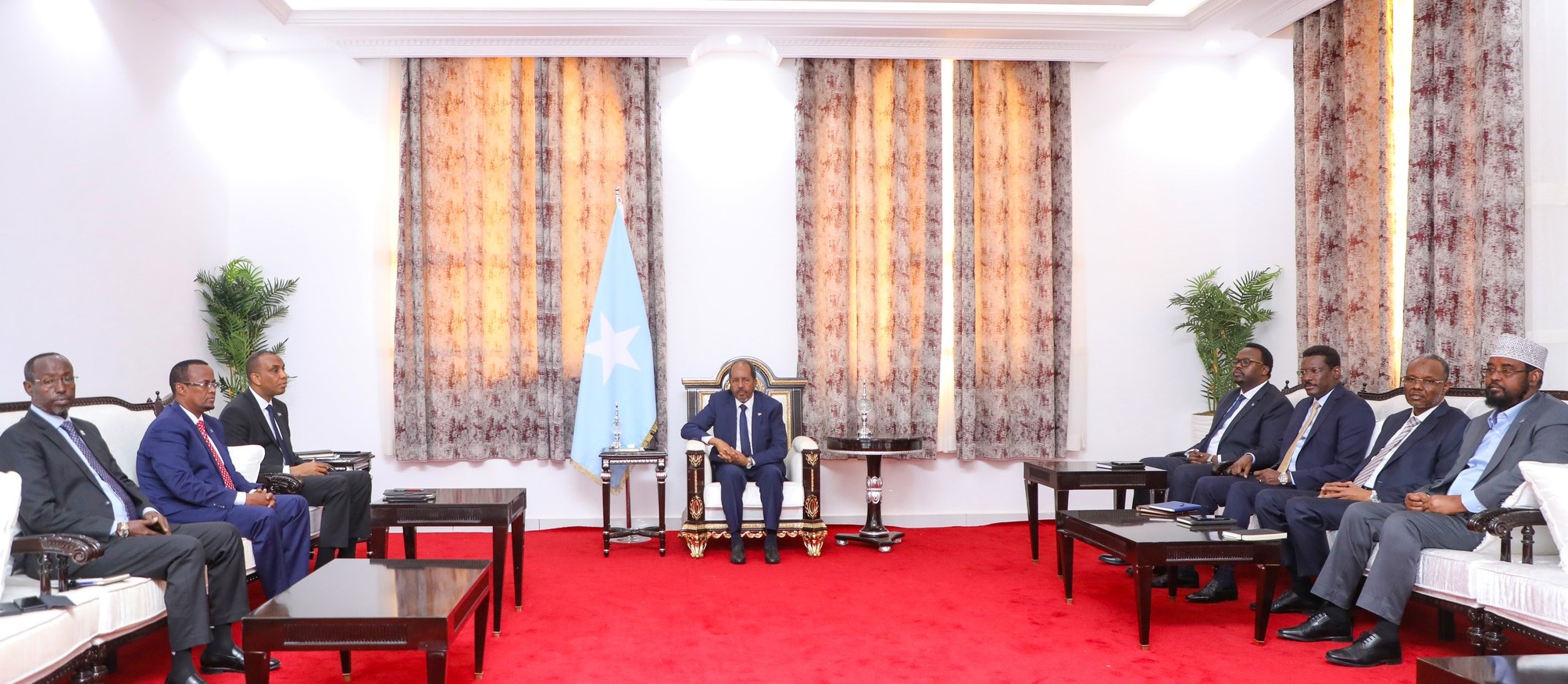NCC IN BAIDOA: Demonstrating inclusive politics and development in Somalia

GOOBJOOG NEWS | BAIDOA: President Hassan Sheikh Mohamud recently chaired the 5th National Consultative Council (NCC) meeting in Baidoa bringing together the leadership of the Federal Government of Somalia (FGS), presidents of four Federal Member States (FMS), and Benadir Regional Administration (BRA) to discuss crucial issues facing Somalia.
The Southwest State President Abdiaziz Hassan Mohamed (Laftagareen) hosted the meeting signifying the role FMS’s play in contributing to the Federal Government’s efforts to move the national agenda forward.
The heart of the meeting’s agenda revolved around significant constitutional matters namely models of federal and regional government elections, national security architecture, and fiscal federalism.
The leaders also deliberated on the second phase of the fight against Al-Shabaab in the Southwest region.
During their meeting, the leaders reached an agreement on national security architecture and on fiscal federalism, which calls for the establishment of two independent bodies, the National Revenue Agency, and the Commission for Allocation and Acceleration of Income.
Additionally, the leaders deeply discussed holding a one-person, one-vote election system and agreed to study the matter further during the next National Consultative Council meeting.
INCLUSIVE POLITICS
The NCC reflects the President’s commitment to maintaining inclusive political stability in Somalia, as shown by his efforts to address the root causes of the country’s long-standing problems.
One of the key topics discussed at the summit was the completion of federalizing state institutions, which is a critical component of Somalia’s democratic transition.
This strategy seeks to decentralize power and increase local participation in decision-making, resulting in improved service delivery and a more inclusive political system.
The federalization of governmental institutions tries to address Somalia’s historical marginalization of certain areas and populations.
The country’s political system has been defined by centralized control for decades, resulting in disparities in resource distribution, service delivery, and representation.
The federalization of state institutions is a measure taken by the government to guarantee that all geographical areas of the nation have a role in national governance and that their opinions are heard.
Agreements at the consecutive NCC’s are meant to address all contentious issues in the provisional constitution to be able to finally produce a commonly agreed constitution.
The provisional constitution, which was adopted in 2012, outlines the country’s political framework and sets out the principles of federalism, democracy, and human rights; however, there are still many areas of contention that need to be addressed, including the allocation of powers and resources between the federal government and the regional states.
The completion of the constitution review process and the establishment of other federal institutions are critical steps towards achieving political stability and economic development in Somalia.
The President’s commitment to completing the review process and ensuring that the new constitution reflects the will of the Somali people is a testament to his vision for a more inclusive and democratic Somalia.
As a result of the President’s dedication to working with all parties to build peaceful political solutions on these problems, the country’s efforts to create political stability and reconciliation have recently made significant progress.
To ensure that the new constitution reflects the opinions of the Somali people, all political actors, including opposition groups, civil society organizations, and the general public, must participate in this process.
Besides the National Consultative Council meeting, the President has also been engaging in other positive agendas, such as the ‘Train of Peace Tour.’ This tour saw him visit the capitals of each of the Federal Member States, where he met with local leaders and residents to discuss issues of concern.
The tour was a significant step forward in promoting peace and reconciliation in the country and was welcomed by many Somalis.